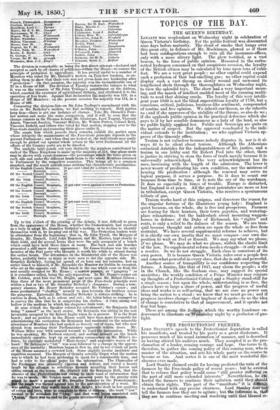TOPICS OF THE DAY.
THE QUEEN'S BIRTHDAY.
LOYALTY was resplendant on Wednesday night in celebration of Queen Victoria's birthday. For the public festival was discounted
nine days before maturity. The cloud of smoke that hangs over this great city, in defiance of Mr. Mackinnon, glowed as if there had been conflagrations enough to ruin all. the insurance-offices, only with a more silvery light The glow testified, as a vast beacon, to the force of public opinion. Measured in the carbu- rated hydrogen consumed on that auspicious occasion, the loyalty of the British citizen may be calculated by tons upon tons of cubic feet. We are a very great people : no other capital could expend such a profusion of that bad-smelling gas; no other capital could display such a vast throng as slowly wound and unwound its lengthened skein through the thoroughfares on Wednesday night, to view the splendid toys. The show had a very important mean- ing, and the march of intellect enabled most of the running .multi- tude to read that shining oracle. The loyalty of this very intelli- gent year 1850 is not the blind superstitious loyalty of 1750, but a conscious, critical, judicious, business-like sentiment, compounded of routine and free opinion. We inherit our Queen, as she inherits us ; and if she approves of the stability of the throne, so also do we; if she applauds public opinion in the practical deference which she pays to it by her sensible demeanour as a lady of the land, so also we public highly applaud her. Public and Sovereign are quits on the matter Of respect. But the approval vouchsafed to the indi- vidual extends to the institution; we who applaud Victoria ap- prove of the Queenly office.
Truism is not valueless because nobody disputes it, nor is it al- ways fit to be silent about truism. Although the Athenians ostracized Aristides for the indisputableness of his justice, and a truism in one lobby sent Sir Robert Peel into the other, there is justice in striving to stem the force of truth merely because it is universally acknowledged. The very acknowledgment has its uses, increasing with the length of the admission. The lover is never weary of predicating his own condition, nor the mistress of hearing the predication : although the renewal may serve no logical purpose, it serves a purpose. So it does to count our treasure from time to time or to note the cry of the watchman.
It does so especially in time, of trouble. Europe is disturbed, but England is at peace. All the great potentates are more or less in tribulation, except Queen Victoria, who receives a spontaneous tribute of gas.
Truism works hard at this enigma, and discovers the reason for the singular fortune of the illustrious young lady: England is quiet because, on the whole she is free and prosperous. Farmers are fearing for their hunters, their town gayeties, and watering- place relaxations; but the balderdash about mounting waggon- horses in defence of the Duke of Richmond, his " rights " and rents, is only a relief to the dulness of the season. We are tran- quil because thought and action are upon the whole so free from restraint. We have several supplemental reforms to achieve, but it is chiefly our own inertia-that we must conquer—our own dis- position to wait on Peel or Russell. We may say what we please, if we please. We may do what we please, within the elastic limit of the law. No supplemental reform needs a struggle—it only needs a resolve. So we do not struggle. Each class is conscious of its own power. It is because Queen Victoria rules over a people free and somewhat powerful in every class, that she is safe and powerful. Another source of tranquillity is our confidence respecting the
future. A famine like that of 1847, may alarm the people; a stir in the Church, like the Gorham case, may suggest its special anxieties; the weakly condition of a Prime Minister may conjure up thoughts of a Protectionist Cabinet and a Stanley stand-still for a single season ; but upon the whole, understanding is so free, the classes have so large a share of power, and the progress of useful ideas and works is so self-acting, that we are sure no power can bring the nation to a stand : we know that we must go on ,• and if progress involves change—that bugbear of despots—to us the idea of change is correlative to that 9f improvement, and it speaks not fear but hope.
These are among the fe lchich the worthy Londoner en- deavoured to illustrate on'Wødsday night by a profusion of gas- light.


























 Previous page
Previous page